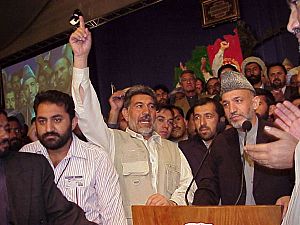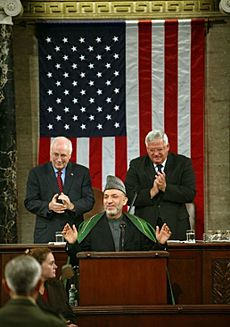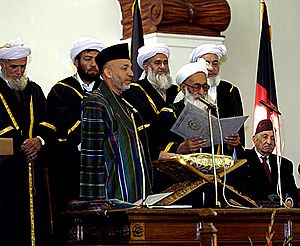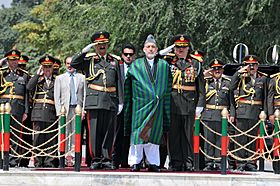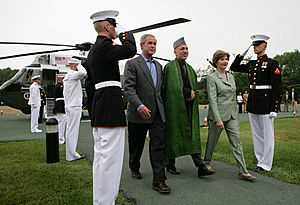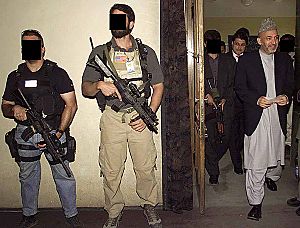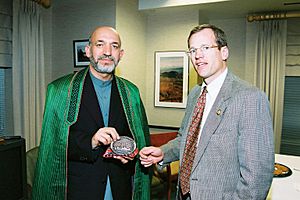Hamid Karzai facts for kids
Quick facts for kids
Hamid Karzai
|
|
|---|---|
|
حامد کرزی
|
|
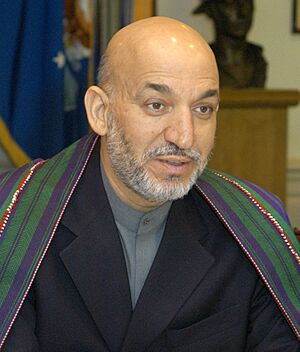
Karzai in 2004
|
|
| 7th President of Afghanistan | |
| In office 13 June 2002 – 29 September 2014 |
|
| Vice President |
|
| Preceded by | Burhanuddin Rabbani |
| Succeeded by | Ashraf Ghani |
| Chairman of the Afghan Interim Administration | |
| In office 22 December 2001 – 13 June 2002 |
|
| Vice Chairman |
|
| Personal details | |
| Born | 24 December 1957 Karz, Kingdom of Afghanistan |
| Political party | Independent |
| Spouse |
Zeenat Karzai
(m. 1999) |
| Children | 4 |
| Parent |
|
| Alma mater | Himachal Pradesh University |
| Military service | |
| Battles/wars | War in Afghanistan
United States invasion of Afghanistan
|
Hamid Karzai (born 24 December 1957) is an Afghan politician who was the president of Afghanistan from 2002 to 2014. He was the country's first democratically elected president after the fall of the Taliban in 2001. He is also a tribal chief of the Popalzai Pashtun tribe.
Born in Kandahar, Karzai studied in Afghanistan and later earned a master's degree in India. He became a fundraiser for the Afghan mujahideen, who were fighting against the Soviet army in the 1980s. After the Taliban took control of Afghanistan, Karzai worked against their rule.
When the United States and its allies removed the Taliban from power in late 2001, Karzai was chosen to lead the country's temporary government. In 2004, he won the presidential election and served two terms. During his presidency, he worked to build alliances between different groups in Afghanistan. However, his relationship with the United States and NATO became tense over time.
After the Taliban returned to power in 2021, Karzai stayed in Kabul. He has since become a strong voice inside Afghanistan, calling for the Taliban to allow girls and women to go to school and university.
Contents
Early Life and Political Start
Hamid Karzai was born on December 24, 1957, in Kandahar, Afghanistan. His family was very involved in politics. His father, Abdul Ahad Karzai, was a Deputy Speaker in the Afghan Parliament in the 1960s. His family were strong supporters of Afghanistan's last king, Mohammed Zahir Shah.
Karzai went to high school in Kabul. In 1976, he traveled to India as an exchange student and earned a master's degree in political science. After finishing his studies, he moved to Pakistan. There, he helped raise money for the Afghan rebels, known as the mujahideen, who were fighting the Soviet army.
After the Soviets left and their government in Afghanistan fell in 1992, Karzai became the Deputy Foreign Minister. When the Taliban came to power in the mid-1990s, Karzai at first thought they might bring peace. But he soon refused to work with them, feeling they were being controlled by outside forces.
In July 1999, Karzai's father was assassinated in Quetta, Pakistan. After this, Karzai became the leader of his tribe and began working closely with the Northern Alliance, a group fighting against the Taliban. He traveled to Europe and the United States to build support for his cause.
Becoming President of Afghanistan
After the September 11 attacks in 2001, the United States led an invasion of Afghanistan to remove the Taliban from power. Karzai worked with U.S. special forces and led an uprising of Pashtun tribes against the Taliban in the Kandahar area.
In December 2001, Afghan leaders met in Bonn, Germany, to plan a new government. They chose Karzai to be the chairman of the Afghan Interim Administration. He was sworn into office on December 22, 2001.
In June 2002, a loya jirga, or grand assembly of Afghan leaders, appointed Karzai as the interim president. This gave him the job of leading the country as it prepared for democratic elections.
Outside of the capital city of Kabul, Karzai's power was limited at first. He was sometimes called the "Mayor of Kabul." He worked to build alliances with local leaders across the country to unite Afghanistan.
First Democratic Election
In October 2004, Afghanistan held its first-ever democratic presidential election. Karzai ran against 22 other candidates. He won the election with 55.4% of the vote, winning in 21 of the 34 provinces. This meant he became the first democratically elected leader of the Islamic Republic of Afghanistan.
His official inauguration took place on December 7, 2004, in Kabul. The ceremony was attended by world leaders, including former U.S. Vice President Dick Cheney. It was seen as a new beginning for the war-torn nation.
Karzai's Time as President
As president, Karzai faced many challenges. He worked to rebuild Afghanistan's economy, which began to grow after years of war. However, the country still relied heavily on aid from other nations.
One of his biggest challenges was the ongoing fight against the Taliban. Karzai often criticized U.S. and NATO military operations for causing civilian casualties. He argued that the fight against terrorism should focus on terrorist hideouts outside of Afghanistan.
Karzai also tried to make peace with the Taliban. He often called them his "brothers" and invited them to join peace talks. He believed that pardoning militants who laid down their weapons was necessary to end the violence.
Second Term and Challenges
Karzai won re-election in August 2009. However, the election was troubled by claims of fraud and low voter turnout. A second-round runoff was planned, but his opponent, Abdullah Abdullah, withdrew. Karzai was then declared the winner.
During his second term, his relationship with the United States and other Western countries became more strained. He continued to speak out against civilian deaths and pushed for more Afghan control over military operations.
Foreign Relations
Karzai's relationship with the United States was very important. The U.S. had helped him come to power and gave billions of dollars in aid to rebuild Afghanistan. But over the years, Karzai grew more critical of U.S. actions in his country.
He maintained good relations with neighboring countries like Pakistan and Iran. He often called Afghanistan and Pakistan "inseparable twin brothers." He also signed a strategic partnership with India in 2011 to strengthen ties between the two nations.
Assassination Attempts
As a key figure in post-Taliban Afghanistan, Karzai was a target for many assassination plots. He survived several attempts on his life.
- September 2002: A gunman in a military uniform opened fire on him in Kandahar. Karzai was unhurt, but the governor of Kandahar was wounded.
- September 2004: A rocket missed his helicopter while he was flying to the city of Gardez.
- June 2007: The Taliban fired rockets near a location in Ghazni where he was giving a speech.
- April 2008: Insurgents attacked a military parade in Kabul that Karzai was attending. He was unharmed, but three other people were killed.
Life After the Presidency
Karzai's second term ended in September 2014, and he was succeeded by Ashraf Ghani. After leaving office, Karzai remained an influential figure in Afghan politics.
When the Taliban took over Afghanistan in August 2021, Karzai chose to stay in Kabul with his family. He, along with Abdullah Abdullah, met with Taliban leaders to discuss the future of the country.
Since then, Karzai has become a leading advocate for women's rights in Afghanistan. He has repeatedly called on the Taliban to reopen schools and universities for girls and women. He argues that educating girls is essential for the country's progress and self-reliance.
Personal Life
In 1999, Hamid Karzai married Zeenat Quraishi, a doctor who was working with Afghan refugees in Pakistan. They have four children: a son named Mirwais, and three daughters.
Karzai is known for his distinctive style of dress. He often wears a karakul hat, a traditional cap worn by many past Afghan leaders, along with a traditional Afghan robe.
Awards and Honors
Karzai has received many awards and honorary degrees from institutions around the world.
- An honorary knighthood from Queen Elizabeth II of the United Kingdom (2003).
- The Philadelphia Liberty Medal (2004).
- Honorary doctorates from Boston University (2005), Georgetown University (2006), and his former university in India (2003).
See also
 In Spanish: Hamid Karzai para niños
In Spanish: Hamid Karzai para niños
- List of presidents of Afghanistan
- Politics of Afghanistan
- Mahmoud Karzai
- Ahmed Wali Karzai
- Kabul Bank crisis
- Afghan Peace Jirga 2010
- Hamid Karzai International Airport
Books/Articles
- Dam, Bette. A Man and a Motorcycle, Ipso Facto Publ., Sept. 2014.
- Dam, Bette. "The Misunderstanding of Hamid Karzai", Foreign Policy, Oc.t 3, 2014.
 | Ernest Everett Just |
 | Mary Jackson |
 | Emmett Chappelle |
 | Marie Maynard Daly |


